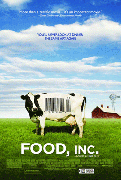
As immigrants and natives alike know, many parts of American culture are worth emulating.
But one aspect that Arab Americans and others should avoid is the food industry. The widely-praised new documentary movie “Food, Inc,” which can be seen at the Main Art Theatre in Royal Oak and others nationwide, makes that point loud and clear in what could be one of the most significant films in years.
The way we eat has changed more in the past 50 years than in the previous 10,000 according to the film, as a small group of multi-national corporations now control our food “from seed to market” and put thousands of farmers out of business worldwide.
This has adversely affected not just waistlines but the health of people and the planet.
One focal point of “Food, Inc.” is the meat industry. Unlike the Islamic standard of slaughtering for halal meat, which is both humane to animals and respectful of the environment, the current American system exists to produce vast quantities of meat cheaply in response to the fast food boom. Food that is expensive to produce like dollar menu hamburgers can be sold cheaply to meet demand while nutritious food prices remain high as medical bills skyrocket.
Quality usually takes a backseat to quicker and cheaper; consequences be damned.
Instead of feeding cattle grass as nature intended, most are now fed corn, which is cheaper. And instead of cows and chickens grazing and dropping manure in pastures as fertilizer, “stadium-sized” collections of manure are flushed downstream from massive factories, creating huge “dead zones” in bodies of water that destroy the environment and contaminate food and water supplies.
As for corn, it is thanks to government subsidies that keep it cheap.
“Corn has conquered the world in a lot of ways,” said Michael Pollan in the movie, the author of “The Omnivore’s Dilemma.” “So much of what we eat is a clever rearrangement of corn.”
Many of those products contain high fructose corn syrup, which is chemically similar to sugar but must undergo processing to be created. It can be used as a preservative and is easily transported, so it’s now in items like sodas, ketchup, and even food thought to be healthy like granola bars and wheat bread, oftentimes as one of the main ingredients.
The Corn Refining Agency (CRA) preaches moderation, but HFCS is hard to avoid for all but the most meticulous shopper because of its prevalence. While no link has officially been drawn between HFCS and diabetes, the movie adds that one in three Americans born after 2000 will contract early onset diabetes and in minorities, the rate is one in two, likely as the result of poor diets with too much sugar, simple carbs, or similar substances. It’s a big problem for Arab Americans according to Dr. Peter Arvan of the University of Michigan’s Comprehensive Diabetes Research Center.
As for corn farmers, they are taught to produce as much corn as possible. When American corn flooded Mexican markets, about 1 ½ million farmers were put out of business according to “Food, Inc.” Many ended up in the U.S. as cheap labor after factory farms advertised for their services and were later arrested.
Finally, and perhaps most importantly, is the issue of seed patenting that has come to the forefront of agricultural politics. In the 1980s, the U.S. Supreme Court began allowing companies to patent seeds, and the company Monsanto, which formerly produced DDT (pesticides) and the Agent Orange chemical used in the Vietnam War, has patented its own genetically-modified soy and corn seeds among others.
The decision to patent life was controversial and scientists have debated the effects modified crops will have on human health and the environment.
“Food Inc.” also says the company sues farmers that use or save their seeds, which arrive via wind gusts or through pollination and can be hard to distinguish. According to a press release from January 2005 by the Center for Food Safety, an average of $412,259.54 had been paid per farmer in cases with recorded judgments for a total of over $15 million won by the company.
While “Food, Inc.” paints a gloomy picture of the industry and the havoc it is wreaking, it is entertaining throughout and wisely offers solutions at the end for taking the power back.
Organic produce sales are growing by 20% annually, and the movie encourages people to continue to support local growers and to buy seasonal produce.
Consumers can “vote with their forks” three times a day, while keeping up with new bills being passed in Congress that might be vague or misleading in nature to benefit large corporations, examining potential conflicts of interest in governing bodies, and placing pressure on the industries much like how the tobacco industry was eventually reined in.
And don’t forget to support local restaurants and food producers, because while there are plenty of outstanding and healthy local businesses to support in Dearborn, the same can’t be said for many of the surrounding suburbs, and the right to nutritious, healthy food is something that should be protected with the passion for any other constitutional right.
For more information on how to take action, go to www.foodincmovie.com.






Leave a Reply